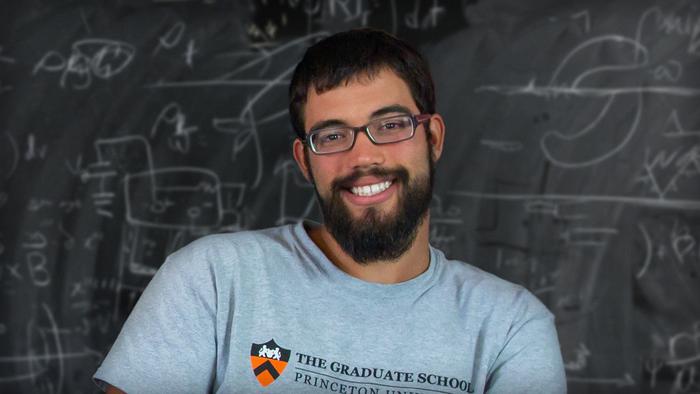Eduardo Rodriguez, a 2022 graduate of the Princeton Program in Plasma Physics hosted by the U.S. Department of Energy’s (DOE) Princeton Plasma Physics Laboratory (PPPL), has won the Marshall N. Rosenbluth Outstanding Doctoral Thesis Award. Given each year by the American Physical Society (APS), the prize “recognizes exceptional early career scientists who have performed original thesis work of outstanding scientific quality and achievement in the area of plasma physics.” Recipients receive a certificate, $2,000 and an invitation to give a presentation about their doctoral research at the annual Meeting of the APS Division of Plasma Physics. Five of the last eight recipients of the prize have been Princeton graduates.

Credit: PPPL Communications Department
Eduardo Rodriguez, a 2022 graduate of the Princeton Program in Plasma Physics hosted by the U.S. Department of Energy’s (DOE) Princeton Plasma Physics Laboratory (PPPL), has won the Marshall N. Rosenbluth Outstanding Doctoral Thesis Award. Given each year by the American Physical Society (APS), the prize “recognizes exceptional early career scientists who have performed original thesis work of outstanding scientific quality and achievement in the area of plasma physics.” Recipients receive a certificate, $2,000 and an invitation to give a presentation about their doctoral research at the annual Meeting of the APS Division of Plasma Physics. Five of the last eight recipients of the prize have been Princeton graduates.
The award’s citation notes that Rodriguez’s thesis demonstrated “fundamental and path-breaking discoveries in the theory of quasisymmetric magnetic fields and their applications to stellarators,” a type of fusion energy machine invented by PPPL founder Lyman Spitzer. Stellarators can operate continuously for long periods of time and do not have the disruptive instabilities that can occur inside doughnut-shaped fusion devices known as tokamaks.
“This is definitely a significant award,” said Rodriguez, now a Humboldt Research Fellow at Germany’s Max Planck Institute for Plasma Physics. “There’s only one given each year and it recognizes not only the quality of the research, but also its relevance to the field. It’s a huge deal, and I feel very honored.”
Rodriguez’s thesis focused on quasisymmetry, when the shape of the magnetic field in a fusion device changes from one location on the machine to another, but has the same strength all around, producing the same steady confinement as tokamaks without the disruptions. “My research focused on reimagining the concept of quasisymmetry from the ground up,” Rodriguez said, “exploring a variety of properties and looking at them in different ways.”
“Eduardo has made original and path-breaking contributions to stellarators with quasisymmetry, including a rigorous mathematical formulation of the properties of quasisymmetric magnetic fields that will stand the test of time,” said Amitava Bhattacharjee, a professor of astrophysical sciences at Princeton University. “In many ways, his thesis rewrites the book on quasisymmetry and has produced 10 imaginative and impactful publications, which is unusual productivity by any standard. He is a rising star.”
As a Humboldt Fellow, Rodriguez is spending two years continuing research on stellarators. During this time, he has focused on the theory behind stellarator optimization, when scientists tailor the properties of these magnetic fusion devices to help them better confine the hot plasma particles. “I’m staying in the world of stellarators, but branching away from the research I did in my thesis,” Rodriguez said. “Specifically, I’m doing theoretical work for understanding properties and behavior of new stellarators.” Once his fellowship term has finished, Rodriguez plans to continue at the Max Planck Institute as a postdoctoral researcher.
Mixing practical problems with beautiful math
“Stellarator research fascinates me because it’s a combination of solving a practical problem — producing fusion-generated electricity for the grid — and doing interesting theoretical work, since the physics and mathematics are inherently interesting,” Rodriguez said.
“In addition, because the problem is hard and stellarator research has not been a mainstream topic in fusion research for many years, there are many things that no one has thought of or addressed yet,” Rodriguez said. “So, working on this topic feels fresh.”
PPPL is mastering the art of using plasma — the fourth state of matter — to solve some of the world’s toughest science and technology challenges. Nestled on Princeton University’s Forrestal Campus in Plainsboro, New Jersey, our research ignites innovation in a range of applications, including fusion energy, nanoscale fabrication, quantum materials and devices, and sustainability science. The University manages the Laboratory for the U.S. Department of Energy’s Office of Science, which is the nation’s single largest supporter of basic research in the physical sciences. Feel the heat at https://energy.gov/science and http://www.pppl.gov.



